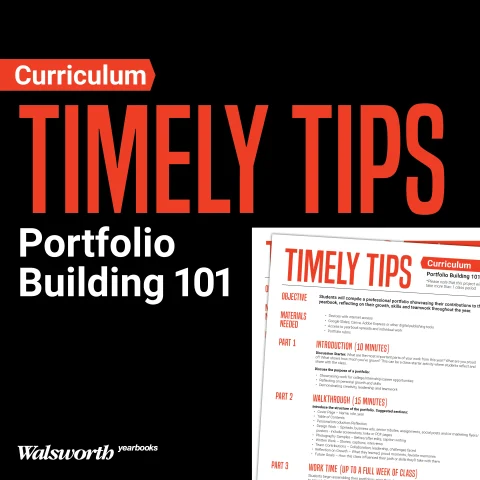Judy Pierce feels like she cannot catch a break. Five years ago, Pierce took over the yearbook program at Cedarcrest High School in Duvall, Wash., and from day one, management of the class came with complications.
Thanks to the system of block scheduling used at Cedarcrest, all classes, including yearbook, would completely turn over with new students at the end of the first semester. In other words, after working with one yearbook staff through the fall and winter, almost an entirely new staff would fall into Pierce’s lap in the spring.
“I would get a whole new bunch of kids on Feb. 1. Our Feb. 15 deadline is one of our biggest of the year. It’s really crunch time,” said Pierce. “I couldn’t expect brand new kids to be a part of that, so it was pretty much up to the first semester kids to make sure the pages were done, or they would have to come back in once the class was over. It was basically cramming a year’s worth of work into one semester.”
Pierce’s life did not get any easier two years ago, after word was passed down that her elective yearbook class would only be offered for the first semester. There would be no second semester class at all.
“I had to make four of my yearbook editors T.A.’s, so they could come in and work on the yearbook during the second semester,” said Pierce. “I would be teaching my science class, and they would be there working on yearbook.”
Such is life for some yearbook advisers working at schools that use full block scheduling. Pierce’s story is not unique. Some have struggled with the system in its various forms. Many others have learned to love it, and even made the system work for them.
A grand experiment
School districts all over the country have been experimenting with varieties of block scheduling for decades, with its popularity booming in the past 10 years. The basic principle turns the traditional school day structure upside down and allows students to take fewer subjects at a time in much longer class periods, along with the variety of getting different class experiences on different days of the week.
Opinions on the merits vary from school to school. However, there has been in particular a serious adjustment for classes such as yearbook, as many schools have jumped back and forth between using block scheduling one year, then not the next.
Proponents of block scheduling have argued that the benefits of the system, including more in-depth class time and more personal interaction with the teacher, are positives for yearbook.
Cindy Wood, the yearbook adviser at Blue Springs South High School in Blue Springs, Mo., is one of those proponents. Her school had used a modified block schedule for the past few years, before switching back this year.
“We changed back, and I’m bummed about it,” said Wood. “With that longer time period, it just seemed like we didn’t have as many interruptions and we got more work done.”
Making it work
Stuart Prince, the yearbook adviser at Todd Beamer High School in Federal Way, Wash., understands the difficulties of a full block schedule for publications. His school uses 90-minute class periods, but the class also turns over with new students at the semester.
In addition, Todd Beamer High’s school district uses open choice policies that allow automatic entry into electives for any student interested. There is no recruitment or selection process for the yearbook staff, which means students end up in the yearbook room not fully grasping the commitment.
“We try to explain what the expectations are for yearbook up front, but there are always kids in the class that don’t quite understand. I like the fact that I get 90 minutes a day with the kids,” said Prince. “Plus, after the second semester starts, I get kids that don’t know what a pica or a gutter are. We use a pretty condensed,crash course of terminology over the first few weeks to get them up to speed.”
Journalism teachers who have been on both sides of the block scheduling fence can typically provide helpful tips to advisers dealing with the structure for the first time.
- Prince and Pierce both agreed that choosing yearbook editors carefully takes on utmost importance with block scheduling, since they are often called on to help train new yearbook students mid-stream.”I’m looking for somebody who is mature,” said Prince. “I’m looking for somebody who can talk to other kids and work with them, not simply walk up and say, ‘that sucks, do it better.'”
- Organization from the teacher is a vital necessity, thanks to the longer class periods. Teachers need to have a structure mapped out for the entire 90 minutes. Wood said her yearbook staff starts and ends each class period with a short meeting to go over assignments for the day, and track what was accomplished.”Kids tend to get real strung out in different directions. It’s easier for them to goof around for 90 minutes than work for 90 minutes,” said Wood. “That’s why the beginning and the end of each class period is teacher time to talk.”
- More time in the classroom should lead to more work getting done during the day, but Pierce said it is imperative that the adviser continually drives that message home by keeping kids busy, strictly enforcing deadlines and monitoring what gets done on a daily basis.”Kids would procrastinate, because they thought they had all the time in the world,” said Pierce. “I used to be a taskmaster, and I would always be harping that they needed to be doing something. They never got the sense that there was too much time.”Like Blue Springs South, other schools are moving back to traditional schedules. Pierce’s school, Cedarcrest, did that this year for various reasons, most notably because of worries about the long time gaps that crept up between core courses in some instances. For example, a student might take a math class the first semester of their freshman year, then not take another math class until the second semester of their sophomore year.
Ironically, the change back has not made yearbook life any easier for Pierce.”This year, I don’t even have a yearbook class, thanks to budget cuts,” said Pierce. “We’re now a club that does the yearbook after school.”



